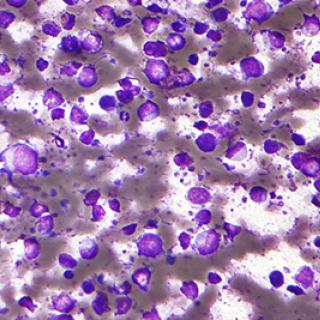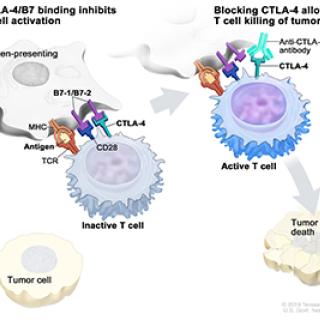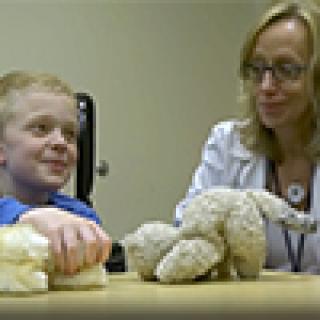News and Events
Proteins Released from the Nuclei of Dying Cancer Cells Promote Tumor Growth
Material released from dying cancer cells, known as tumor cell nuclear expulsion products (TuNEPs), contains specific proteins that promote the growth of neighboring cancer cells. Targeting these proteins could lead to new treatments that hinder cancer spread and improve patient outcomes.
Read MoreJohn Schiller elected to the National Academy of Sciences
John T. Schiller, Ph.D., Deputy Chief of the Laboratory of Cellular Oncology, has been elected to the National Academy of Sciences for his distinguished and continuing achievements in original research. Dr. Schiller, in close partnership with Dr. Doug Lowy, has made fundamental contributions to our understanding of human papillomavirus (HPV) culminating in the development of the prophylactic vaccines Cervarix and Gardasil, which protect from HPV-related cancers, including cervical cancer.
Read MoreNCI initiative aims to boost CAR T-cell therapy clinical trials
Researchers at the Center for Cancer Research are part of a new NCI initiative to manufacture CAR T-cell therapies for clinical trials being conducted at multiple hospitals. Nirali N. Shah, M.D., Lasker Clinical Research Scholar in the Pediatric Oncology Branch, is a co-lead investigator on the first trial of this initiative that is testing a CAR T-cell therapy designed to target a protein on cancer cells called CD33 in children and young adults with advanced forms of acute myeloid leukemia.
Read MoreAndrea Apolo receives Arthur S. Flemming Award
Andrea B. Apolo, M.D., NIH Lasker Clinical Research Scholar in the Genitourinary Malignancies Branch, is a recipient of this year’s Arthur S. Flemming Award, which honors the accomplishments of mid-career federal employees. Dr. Apolo received the award for her work leading a clinical trial demonstrating that avelumab treatment led to prolonged survival in patients with refractory metastatic urothelial carcinoma. She then led the effort to get avelumab approved by the FDA for the treatment of bladder cancer.
Read MoreDr. William Dahut discusses coronavirus and cancer patients on Frankly Speaking about Cancer podcast
William L. Dahut, M.D., CCR Clinical Director, was a guest on the Frankly Speaking about Cancer podcast for their spotlight on coronavirus series. He addressed concerns from cancer patients and their caregivers and shared advice on what cancer patients can do to stay safe.
Read MoreThe discovery of selumetinib for children with NF1
When Brigitte Widemann, M.D., Chief of the Pediatric Oncology Branch (POB), saw selumetinib shrinking the first child’s tumor, she couldn’t believe her eyes. Then, when she saw the second patient’s tumor shrinking, “I thought, oh my gosh, it’s working!” she recalls. Over 30 years of NCI-led and NCI-supported research culminated in clinical trials of selumetinib for kids with neurofibromatosis type 1 (NF1) and associated tumors called plexiform neurofibromas (PNs). With Food and Drug Administration (FDA) approval, selumetinib is now the first effective treatment for kids with PNs that can't be removed by surgery.
Read MoreFDA approves first therapy for children with neurofibromatosis type 1
The Food and Drug Administration (FDA) has approved selumetinib (Koselugo) to treat children with neurofibromatosis type 1 (NF1) and tumors called plexiform neurofibromas. The approval was based on results from a clinical trial, designed and led by Brigitte Widemann, M.D., Chief of the Pediatric Oncology Branch (POB), and Andrea M. Gross, M.D., Assistant Research Physician in POB, that showed the drug shrank neurofibromas in 70 percent of patients. For many children in the trial, treatment with selumetinib also had clinical benefit, improving their pain, function and quality of life.
Read MoreNew genetic analysis will help researchers understand how diffuse large B-cell lymphoma subtypes respond to experimental therapies
By looking for about 100 potential genetic abnormalities in the DNA of certain lymphomas, researchers can now assign individual cases of DLBCL to one of seven subtypes. The new classification system will better equip researchers to recognize the impact of experimental therapies on subsets of patients whose cancers share key clinical and biological features.
Read MoreMouse models and patient data suggest potential biomarker for immunotherapy response in melanoma
Immune checkpoint inhibitors are an effective treatment for about a third of patients with metastatic melanoma. Now, mouse models and patient data suggest these cancers are more likely to respond to immunotherapy if their cells resemble fully developed melanocytes rather than less mature precursor cells.
Read MoreIn Memoriam: Nancy Colburn, Ph.D.
The Center for Cancer Research mourns the recent death of past colleague and friend Nancy Colburn, Ph.D. She was an esteemed member of the NCI community for 36 years from 1976-2012.
Read MoreCCR researchers show selumetinib shrinks tumors in children with NF1
Findings from a phase 2 clinical trial show that the drug selumetinib improves outcomes for children with the genetic disorder neurofibromatosis type 1 (NF1). In the trial, selumetinib shrank the inoperable tumors that develop with NF1 called plexiform neurofibromas, and children experienced reduced pain, improved function, and better overall quality of life after receiving the treatment. This trial was led by Brigitte Widemann, M.D., Chief of the Pediatric Oncology Branch (POB), and Andrea M. Gross, M.D., Assistant Research Physician in POB, and the results were published March 18, 2020, in the New England Journal of Medicine.
Read More









